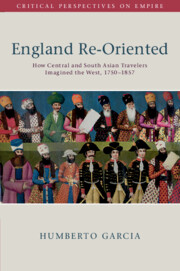Book contents
- England Re-Oriented
- Critical Perspectives on Empire
- England Re-Oriented
- Copyright page
- Dedication
- Epigraph
- Contents
- Figures
- Acknowledgments
- Note on Transliteration
- Introduction
- 1 The British Raj’s Mimic Men
- 2 A Bluestocking Romance
- 3 The Theater of Imperial Sovereignty
- 4 Loving Strangers in Ireland
- 5 Heavenly Bodies in Motion
- 6 Dreaming with Fairyland
- 7 The Making of a Mohamedan Gentleman
- Epilogue
- Book part
- Select Bibliography
- Index
4 - Loving Strangers in Ireland
Indo-Celtic Masculinities in the Travels of Dean Mahomet and Mirza Abu Talib Khan
Published online by Cambridge University Press: 06 November 2020
- England Re-Oriented
- Critical Perspectives on Empire
- England Re-Oriented
- Copyright page
- Dedication
- Epigraph
- Contents
- Figures
- Acknowledgments
- Note on Transliteration
- Introduction
- 1 The British Raj’s Mimic Men
- 2 A Bluestocking Romance
- 3 The Theater of Imperial Sovereignty
- 4 Loving Strangers in Ireland
- 5 Heavenly Bodies in Motion
- 6 Dreaming with Fairyland
- 7 The Making of a Mohamedan Gentleman
- Epilogue
- Book part
- Select Bibliography
- Index
Summary
The fourth chapter argues that Dean Mahomet’s English memoir, The Travels (1793), and Abu Taleb Khan’s Persian travelogue, Masir-i Talibi-fi-Bilad-i-Afranji [“Travels of Talib in the Lands of the Franks”], are bookend ruminations on Ireland before and after the 1798 revolt. Their ambivalent feelings about war are implicated in the dense web of social relations that link India to Ireland. I first examine Mahomet’s account of the 1781 British capture of the Rajah of Benares Chayt Singh, as mediated by newspaper reports about Irish MP Edmund Burke’s condemnation of unmanly colonial abuses in India during the Hastings impeachment trial (1788–1796).Then I discuss Abu Taleb’s reaction to the 1799 British defeat of the sultan of Mysore Tipu Sultan, as celebrated in the Dublin circus production of Philip Astley’s The Siege and Storming of Seringapatam. These writers’ patriotic responses to the theatrics of power imply a kinship with Irish hosts who, in their minds, belong to an Indo-Celtic Eurasia.
Keywords
- Type
- Chapter
- Information
- England Re-OrientedHow Central and South Asian Travelers Imagined the West, 1750–1857, pp. 123 - 169Publisher: Cambridge University PressPrint publication year: 2020
- 1
- Cited by

